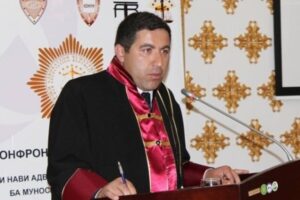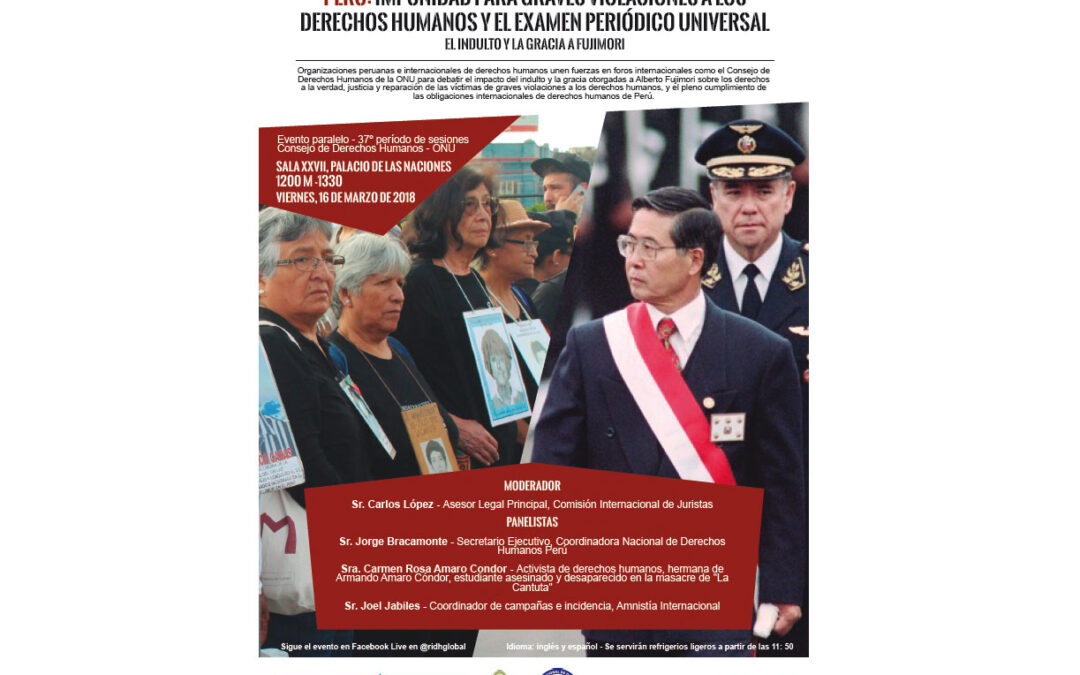
Mar 13, 2018 | Uncategorized
Este evento paralelo – 37º período de sesiones, Consejo de Derechos Humanos, ONU – tendrá lugar el Viernes, 16 de marzo de 2018, 1200 m-1330, Sala XXVII, Palacio de las Naciones, Ginebra, con el apoyo de la CIJ.
Organizaciones peruanas e internacionales de derechos humanos unen fuerzas en foros internacionales como el Consejo de Derechos Humanos de la ONU para debatir el impacto del indulto y la gracia otorgadas a Alberto Fujimori sobre los derechos a la verdad, justicia y reparación de las víctimas de graves violaciones a los derechos humanos, y el pleno cumplimiento de las obligaciones internacionales de derechos humanos de Perú.
Moderador
- Sr. Carlos López – Asesor Legal Principal, Comisión Internacional de Juristas
Panelistas
- Sr. Jorge Bracamonte – Secretario Ejecutivo, Coordinadora Nacional de Derechos
Humanos Perú
- Sra. Carmen Rosa Amaro Condor – Activista de derechos humanos, hermana de
Armando Amaro Cóndor, estudiante asesinado y desaparecido en la masacre de “La
Cantuta”
- Sr. Joel Jabiles – Coordinador de campañas e incidencia, Amnistía Internacional
Sigue el evento en Facebook Live en @ridhglobal
Idioma: inglés y español – Se servirán refrigerios ligeros a partir de las 11:50
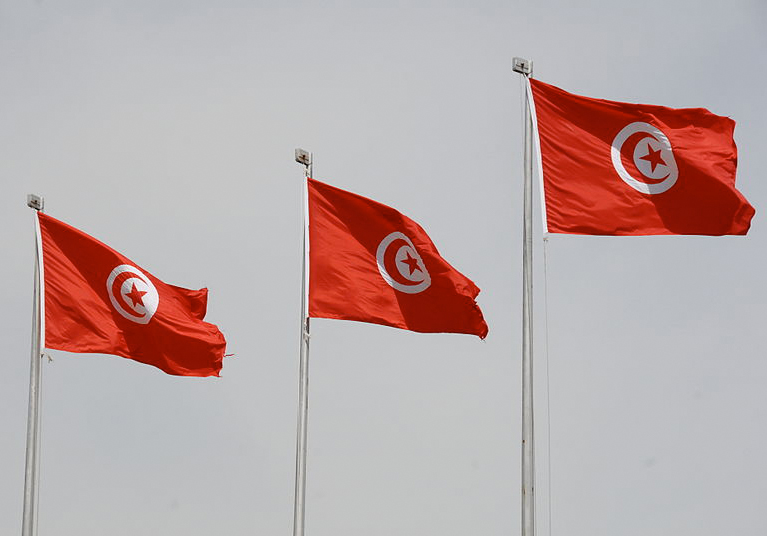
Mar 12, 2018 | News
As they begin the appointment process, the Tunisian authorities must ensure that selection of members of the Constitutional Court are made in compliance with international standards on the independence of the judiciary, the ICJ said today.
This must happen through an open and transparent process and based on prescribed, objective criteria of merit, integrity, and equality before the law, the ICJ adds.
The 2014 Constitution and the Organic Law no. 50 of 2015 on the establishment of the Constitutional Court provide that three bodies are responsible for appointing the 12 members of the Constitutional Court.
These are the Assembly of People’s Representatives (ARP), the High Judicial Council, and the President of the Republic, which each body appointing four out of the 12 members successively.
The Constitution and the Organic Law also provide that members must have 20 years of professional experience and nine of them should have advanced legal expertise.
Over the past three weeks, the ARP has been reviewing the candidates for the Constitutional Court and the election of first four members is due to take place in a general plenary on Tuesday, 13 March 2018.
“Ensuring that the selection and appointment of all members of the Constitutional Court is made on the basis of their legal qualifications, competence and personal integrity is absolutely necessary to the strengthening of rule of law and the protection of human rights in Tunisia” said Said Benarbia, Director of the ICJ Middle East and North Africa Programme.
“In electing the four members, the ARP should ensure that these criteria are fully met, and that the process safeguards against appointments for improper motives, including political considerations and arrangements between political groups,” he added.
The Tunisian authorities should also ensure that the composition of the Constitutional Court reflects the diversity of the community it serves, including by ensuring the equal representation of women in the Court, as well as a significant representation of minority groups.
In a previous memorandum, the ICJ has also urged the authorities to ensure that the selection process guarantees the independence of the institution and of the individual judges in compliance with international standards.
Contact
Said Benarbia, Director of the ICJ Middle East and North Africa Programme, tel: +41798783546, email: said.benarbia(a)icj.org
Background
Article 11 and 12 of Law no. 50 of 2015 provides that the election of candidates by the Parliament and the High Judicial Council shall take place through a secret ballot with the vote of a majority of two-thirds of their members. Article 13 provides that the President of the Republic appoints the last four members of the Constitutional Court.
The 2014 Constitution requires the establishment of the Constitutional Court within a year after the legislative elections. Four years later, and despite the entry into force of Law no. 50 in 2015, the Constitutional Court has not yet been established.
Tunisia-PR-Constitutional-Court-2018-ARA (Full Text in Arabic, PDF)
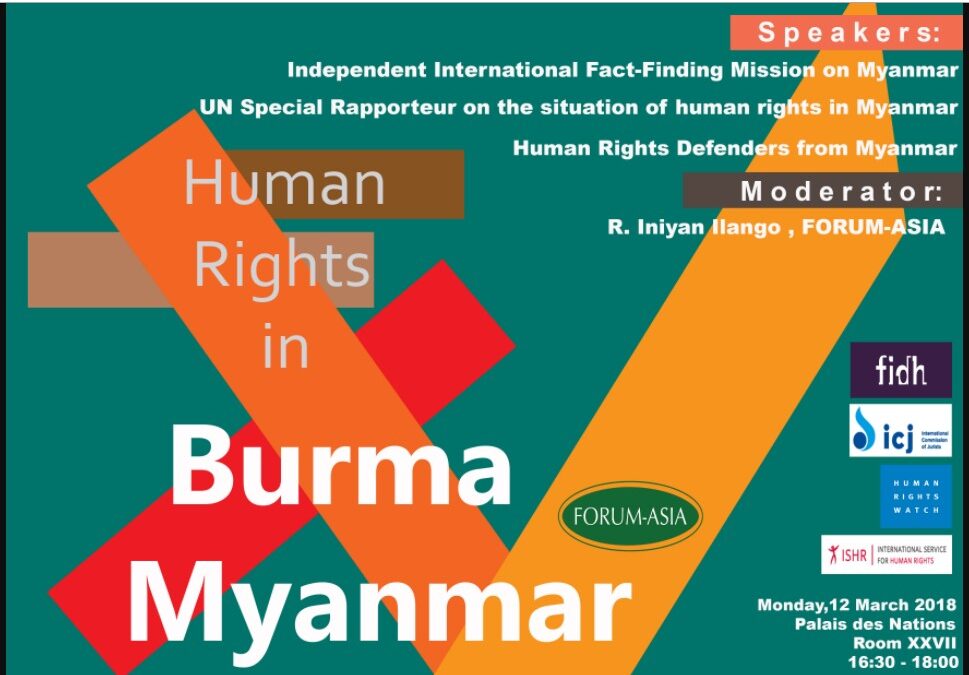
Mar 9, 2018 | Events, News
This side event at the Human Rights Council takes place on Monday, 12 March, 16:30-18:00, room XXVII of the Palais des Nations. It is organized by Forum-Asia, and co-sponsored by the ICJ.
Speakers:
Independent International Fact-Finding Mission on Myanmar
UN Special Rapporteur on the situation of human rights in Myanmar
Human Rights Defenders from Myanmar
Moderator:
R. Iniyan Ilango, Forum – Asia
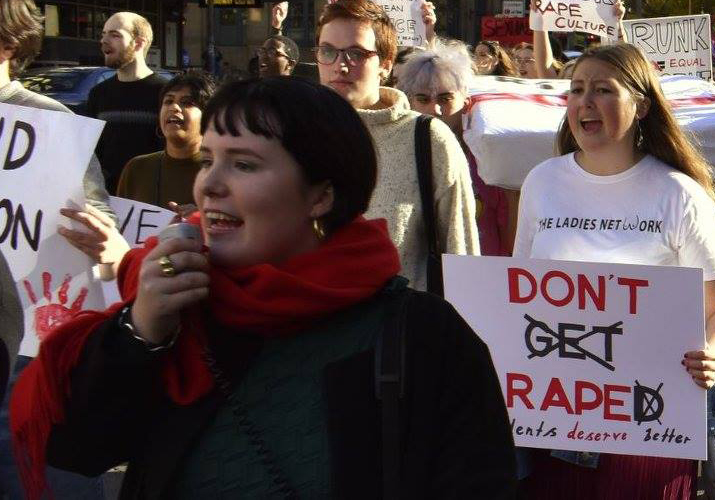
Mar 8, 2018 | Multimedia items, News, Video clips
Today on International Women’s Day the world looks to celebrate the achievements of women and advances made towards the realization of women’s human rights but the day is also an opportunity to address the issues that continue to disadvantage women.
In the 70th anniversary year of the Universal Declaration of Human Rights many women around the world have seen States failing to live up to their obligations to ensure that they are able to exercise their human rights.
Where women’s human rights are violated many women face discrimination, denial of equal protection of the law and other impediments in accessing the justice that they deserve.
“The ICJ has a strong commitment to addressing the obstacles women face in accessing justice,” said ICJ Acting Vice-President, Justice Radmila Dragicevic-Dicic.
“The judiciary has an important role in protecting the rights of women, but in many States there is a lack of proper awareness and understanding of issues such as gender based-violence. Many judges would benefit from judicial education on specific gender-based issues to ensure that women victims are made visible and their rights protected by domestic laws and relevant international standards,” she added.
For several years the ICJ has worked on women’s access to justice issues in different countries in all regions with a variety of stakeholders, including human rights defenders, lawyers, judges, governmental authorities and international rights experts and mechanisms.
For example, in Tunisia, the ICJ issued a memorandum calling on authorities to remove the obstacles women face in accessing justice.
The ICJ has held regional dialogues in Africa and Asia with judges and lawyers.
In Asia, one outcome of this was The Bangkok General Guidance for Judges in Applying a Gender Perspective, designed to assist judges in employing a gender perspective in deciding cases before them, which has since been adopted for use by judiciaries in Indonesia and the Philippines.
In Africa, the need for gendered perspectives in judicial decision-making was also raised in a regional report evaluating sexual and gender based violence (SGBV) and fair trial rights.
The ICJ has undertaken substantial work on women’s access to justice in the context of SGBV, including a report calling for an eradication of harmful gender stereotypes and assumptions and a Practitioners’ Guide on Women’s Access to Justice for Gender-Based Violence.
Both have been used as training tools in Asia, Africa and MENA, most recently at a workshop on SGBV in Swaziland.
Last year the ICJ released a memorandum on effective investigation and prosecution of SGBV in Morocco.
The ICJ has also undertaken trial observations during hearings in the landmark Sepur Zarco case, the first case that resulted in a conviction for sexual crimes that had occurred during Guatemala’s internal conflict in the early 1980s.
The ICJ regularly engages with the UN Human Rights Council and the UN Committee on the Elimination of all Forms of Discrimination against Women to highlight issues around women’s access to justice and call on the international community to be vigilant in upholding women’s rights protections.
“The ICJ is lucky to count among its number some very impressive women human rights defenders, who bring a great deal of expertise to the work of the organization,” said Dragicevic-Dicic.
“The five most recent additions to the ICJ have further strengthened the organization’s ability to speak authoritatively on women’s rights, and I look forward to working with my new colleagues to enhance women’s access to justice,” she added.
The new additions to the ICJ include Dame Silvia Cartwright, Former Governor of New Zealand; Professor Sarah Cleveland, Constitutional and Human Rights Professor at Columbia Law School in the USA; Justice Martine Comte who has over 30 years judicial experience in France; Mikiko Otani, member of the UN Committee on the Rights of the Child from Japan; and Justice Lillian Tibatemwa-Ekirikubinza from the Supreme Court of Uganda.
In an interview with the ICJ, Commissioner Justice Elizabeth Evatt, a distinguished Australian lawyer, jurist and trailblazer for women in the legal profession in her country, spoke about the importance of women being able to access justice.
One of the architects of Australia’s Family Law Act of 1975, Justic Evatt told the ICJ how the Act made divorce more accessible and abolished the Common Law relics that gave men greater rights over women, however new problems have emerged since then.
Justice Evatt explained that “(the Act) was an extremely important reform for women. It made it far easier for men and women to access divorce and have their matters dealt with because the court had conciliation and counselling services and also legal aid was more readily available. But I am afraid that since those days, thing have changed. The Family Court is now beset with delays and obstacles and it is impossible for people to get legal aid. People have to take their case on their own or face huge legal costs, so having begun well, it hasn’t continued well. More resources are needed.”
Justice Evatt also considers that there is a need for the government and the judiciary to take more action to address domestic violence.
However, she noted, “there has been a change over the years with a growing awareness of both the police and the local courts, which are the main ones dealing with violence. They have become far more aware of the need to take action to protect women and prevent violence but the cure for domestic violence does not lie just with the courts but also with the whole of society.”
Watch the interview:
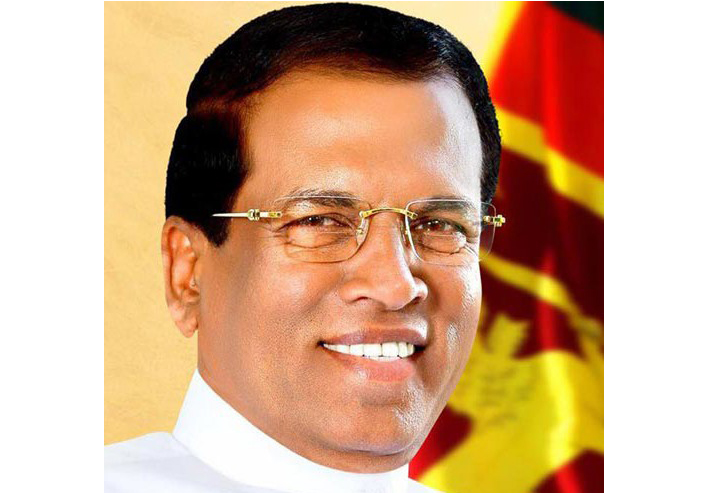
Mar 8, 2018 | News
The Sri Lankan government must act swiftly and in line with human rights to prosecute those responsible for recent communal violence.
Particularly for attacks against the minority Muslim community in Kandy district, while avoiding the abusive practices of the past, said the ICJ today.
Sri Lanka’s President, Maithripala Sirisena, proclaimed an island-wide state of emergency on 6th March 2018, following a curfew imposed in several areas since Monday.
The action came following a spate of attacks against members of the Muslim community that was spreading in the Kandy district, following attacks in Ampara last week, in Gintota in 2016, and Aluthgama in 2014.
“The government must show that it will bring to account those who have incited communal violence, particularly notorious figures who have been emboldened by the pervading impunity to preach hatred openly and publicly. The arrest of key suspects yesterday is a start and convictions must follow,” said Frederick Rawski, ICJ’s Asia director.
“But the government must ensure that its investigation is impartial and effective and follows due process of the law,” he added.
The ICJ called upon the government of Sri Lanka to swiftly prosecute those responsible for inciting and carrying out the communal violence using existing legal provisions in the Penal Code and the ICCPR Act, the latter of which prohibits advocating “national, racial or religious hatred that constitutes incitement to discrimination, hostility or violence.”
The ICJ is concerned that the Emergency Regulations issued by the President through powers under the Public Security Ordinance, confer excessively broad powers on the army and the police to search, arrest and investigate.
“Given Sri Lanka’s experience of Emergency Regulations, the government should ensure that these regulations are time-bound and comply with Sri Lanka’s international human rights obligations, including under the International Covenant on Civil and Political Rights,” said Rawski.
The government has further restricted access to selected instant messaging applications and social media platforms “as an extraordinary but temporary response to limit the increasing spread of hate speech and violence through social media websites and phone messaging applications.”
“Blocking social media and other communication channels, even with the best of intentions, typically has the negative effect of restricting affected persons from seeking assistance, journalists from reporting around the situation and may actually undermine efforts to counter violence and hate speech. Any such measures should be narrowly targeted and limited in time,” said Rawski.
“A better approach would be for the Sri Lankan government to aggressively push back against these hateful narratives by demonstrating in actions as well as its rhetoric that Sri Lanka is a diverse country in which all of its citizens’ rights are respected and protected equally,” he added.
Background
Chapter XVIII of the Constitution and the Public Security Ordinance of Sri Lanka empowers the President to make emergency regulations in the interest of ‘public security and the preservation of public order or for the maintenance of supplies and services essential to the life of the community.’ Sri Lanka has a history of governance using emergency powers, which in the past has posed a challenge for democratic governance and human rights, providing law enforcement with wide powers, circumventing ordinary checks and balances.
The President, while justifying circumstances that led to his proclamation of a state of emergency, has stated that he “has given special instructions the Police and the tri-forces to take action in terms of these regulations, in a lawful manner in good faith while ensuring minimum disturbance to the life and well-being of people, in conformity with Fundamental Human Rights of people.”








